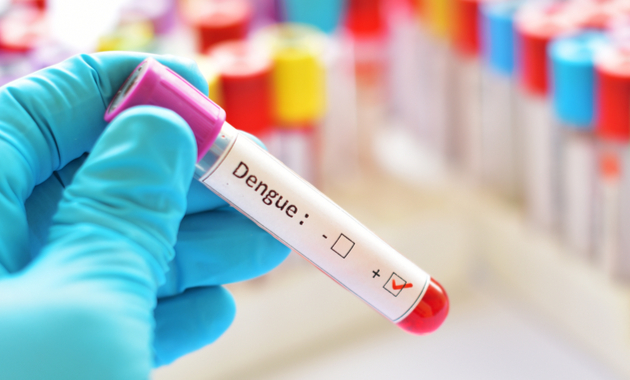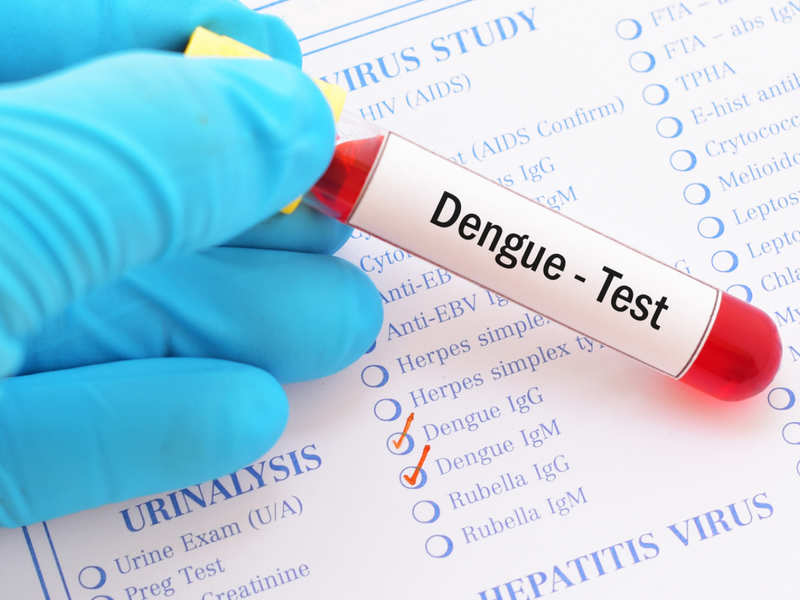Dengue Fever Test
What is a dengue fever test?

Dengue fever is a viral infection spread by mosquitos. The virus can’t be spread from person to person. Mosquitos that carry the dengue virus are most common in areas of the world with tropical and subtropical climates. These include parts of:
- South and Central America
- Southeast Asia
- The South Pacific
- Africa
- The Caribbean, including Puerto Rico and the U.S. Virgin Islands
Dengue fever is rare in the U.S. mainland, but cases have been reported in Florida and in Texas near the Mexican border.
Most people who get dengue fever have no symptoms, or mild, flu-like symptoms such as fever, chills, and headache. These symptoms usually last for a week or so. But sometimes dengue fever can develop into a much more serious disease called dengue hemorrhagic fever (DHF).
DHF causes life-threatening symptoms, including blood vessel damage and shock. Shock is a condition that can lead to a severe drop in blood pressure and organ failure.
DHF mostly affects children under 10. It can also develop if you have dengue fever and get infected a second time before you have fully recovered from your first infection.
A dengue fever test checks your blood for signs of a dengue fever infection. There are two main types of dengue fever blood tests. One looks for the virus itself; the other checks for antibodies to the virus. Antibodies are proteins made by your immune system to fight foreign substances like viruses.
While there is no medicine that can cure dengue fever or DHF, other treatments can help relieve symptoms. This can make you more comfortable if you have dengue fever. It can be lifesaving if you have DHF.
Other names: dengue virus antibody, dengue virus by PCR
What is it used for?
A dengue fever test is used to find out if you have been infected with the dengue virus. It is mostly used for people who have symptoms of illness and have recently traveled to an area where dengue infections are common.
Why do I need a dengue fever test?
You may need this test if you live or have recently traveled to an area where dengue is common, and you have symptoms of dengue fever. Symptoms usually show up four to seven days after being bitten by an infected mosquito, and may include:
- Sudden high fever (104°F or higher)
- Swollen glands
- Rash on the face
- Severe headache and/or pain behind the eyes
- Joint and muscle pain
- Nausea and vomiting
- Fatigue

Dengue hemorrhagic fever (DHF) causes more severe symptoms and can be life-threatening. If you’ve had symptoms of dengue fever and/or have been in an area that has dengue, you may be at risk for DHF. Seek medical help immediately if you or your child has one or more of the following symptoms:
- Severe abdominal pain
- Vomiting that doesn’t go away
- Bleeding gums
- Nose bleeds
- Bleeding under the skin, which may look like bruises
- Blood in urine and/or stools
- Difficulty breathing
- Cold, clammy skin
- Restlessness
What happens during a dengue fever test?
Your health care provider will probably ask about your symptoms and for details on your recent travels. If an infection is suspected, you will get a blood test to check for the dengue virus.
During a blood test, a health care professional will take a blood sample from a vein in your arm, using a small needle. After the needle is inserted, a small amount of blood will be collected into a test tube or vial. You may feel a little sting when the needle goes in or out. This usually takes less than five minutes.
Will I need to do anything to prepare for the test?
You don’t need any special preparations for a dengue fever test.
Are there any risks to the test?
There is very little risk to having a blood test. You may have slight pain or bruising at the spot where the needle was put in, but most symptoms go away quickly.
What do the results mean?
A positive result means you probably have been infected with the dengue virus. A negative result can mean you aren’t infected or you were tested too soon for the virus to show up in testing. If you think you were exposed to the dengue virus and/or have symptoms of infection, talk to your health care provider about whether you need to be retested.
If your results were positive, talk to your health care provider about how to best treat your dengue fever infection. There are no medicines for dengue fever, but your provider will probably recommend that you get plenty of rest and drink lots of fluids to avoid dehydration. You may also be advised to take over-the-counter pain relievers with acetaminophen (Tylenol), to help ease body aches and reduce fever. Aspirin and ibuprofen (Advil, Motrin) are not recommended, as they may worsen bleeding.
If your results are positive and you have symptoms of dengue hemorrhagic fever, you may need to go to the hospital for treatment. Treatment may include getting fluids through an intravenous (IV) line, a blood transfusion if you’ve lost a lot of blood, and careful monitoring of blood pressure.
Is there anything else I need to know about a dengue fever test?
If you will be traveling to an area where dengue is common, you can take steps to reduce your risk of getting infected with the dengue virus. These include:
- Apply an insect repellent containing DEET on your skin and clothing.
- Wear long-sleeved shirts and pants.
- Use screens on windows and doors.
- Sleep under a mosquito net.
Also, a vaccine to prevent dengue fever is available in certain areas where the virus ins common. These include the U.S. territories of American Samoa, Guam, Puerto Rico and the U.S. Virgin Islands. The vaccination is only for people who have had a previous dengue fever infection.If you’ve never been infected with dengue, the vaccine could make you very sick.
To learn more about the vaccine, talk to your health care provider.
Source:- medlineplus.gov






